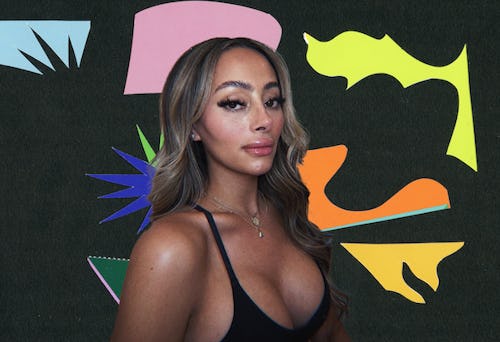For Victoria's Secret model Emira D’Spain, trans visibility and joy are synonymous
The TikTok influencer is paving the way for a new chapter of trans representation.

“Visibility” is a word that gets thrown around a lot these days. At face value, it’s not a hard concept to grasp: to be visible is, literally, to be present or — as ubiquitous a term as this is right now — “seen.” Yet corporate America throws the v-word around as a stand-in for empowerment. Marginalized people, especially trans people, understand that being seen is not the same as being granted the authority to enact change.
It’s rare to see anybody who embodies the true ethos of visibility, in that all-encompassing, heroic American sense. If that person exists right now, I can’t imagine it could be anyone other than Emira D’Spain, TikTok influencer and makeup artist who recently became the first Black trans model to work with Victoria’s Secret.
With more than 794k followers on TikTok, D’Spain becoming a recognizable name within the Gen Z stratosphere thanks to her bubbly makeup videos that drip with charisma. She uses her platform to create real change in queer communities and is currently campaigning with Visible to raise money for the It Gets Better Project, an organization that empowers LGBTQ+ youth around the world.
Although she’s known as a trans influencer now, this Trans Day of Visibility actually marks the one year anniversary since she came out as trans to her blossoming fan base. Since then, she’s leaned more publicly into her identity without relying on that identity as her main selling point. “I don’t talk about being trans in every video, and every so often I’ll say something about it and all these people will be like ‘I had no idea,’” she tells me. “I feel like that’s so powerful because maybe they’d never seen a trans person before or followed a trans person or tapped into the life of a trans person, so now their mind is expanding.”
There’s little doubt that becoming a model for a brand like Victoria’s Secret will make her even more visible to the type of audience that might have never knowingly seen a trans person. In recent years, Victoria’s Secret hasn’t particularly been known as a beacon of inclusivity and its fashion shows have been justifiably criticized for holding outdated views on womanhood (i.e. cis, skinny, white). For this reason, D’Spain’s presence there feels all the more momentous.
She tells me that growing up, her parents would play the VS fashion shows — D’Spain wasn’t allowed to watch with them — and she remembers wishing she could be up there, walking with the other models. “Being a Black trans woman who is paving the way specifically for the little Black and brown and people of color members of the LGBTQ community is very full circle,” she tells me.
It’s hard to know whether D’Spain’s talent would be recognized by a traditional brand like Victoria’s Secret had it not been for a platform like TikTok, where the audience (us) gets to decide who we want to see more of. D’Spain talks about TikTok in the way my younger cousin might talk about a big playground — she marvels at how the platform is constantly pushing users to discover creators they have never heard about or seen, unlike other social platforms like Instagram or Twitter, where your follower count strongly determines your visibility. “[TikTok] has played such a role in expanding everyone’s world view,” she says.
In all of her joy, it can be easy to lose sight of why the rise of Emira, or xoxoemira, is so remarkable. We live in a country where in the past year, 52% of young trans and nonbinary young people considered suicide and 78% described their mental health as “poor,” according to the Trevor Project. Violence against Black trans people has reached epidemic proportions. Add to that the onslaught of homophobic and transphobic legislation all over the country and you get the kind of environment that feels endlessly hostile towards queer people.
But scrolling through D’Spain’s TikToks, there’s nothing but love from users about how safe she makes them feel. Like visibility, safety is a layered word whose meaning changes depending on who you are and the degree to which the state takes an interest in protecting your life. Seeing a confident and joyful Black trans woman living abundantly in New York City, just existing, really, is the type of visibility that creates a profound sense of safety.
“If you want to feel safe, you gotta feel confident,” D’Spain says. “I feel like beauty is the way that I try to make people safe because I feel like a bad bitch when I look like this, so I’m like, let me do the same to you.”